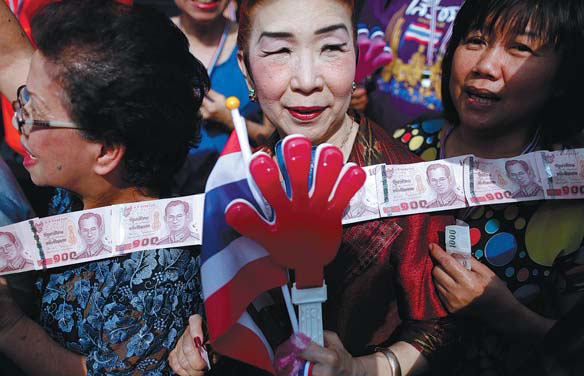Gridlock sinking Thai businesses
Bangkok's middle classes have been at the heart of a three-month protest movement to topple Thailand's government, but as the strife drags on and the economy wilts, the capital's business owners are starting to feel the pain.
While the most committed say they are prepared to swallow the losses for as long as it takes, others say it is time for the protests to stop. No one is willing to bet on negotiations to end the political stalemate any time soon.
"I just want these protests to end," said Pornthep Chaisri, manager of Indie's Kitchen restaurant in the Silom business district near a big protest camp that has seen customer numbers fall by around 80 percent.
|
Anti-government protesters in Thailand collect money for farmers as they march in Bangkok on Friday, seeking to capitalize on discontent in rural areas at the state's failure to pay for rice bought under a controversial subsidy scheme. Damir Sagolj / Reuters |
"It's not good for business, or for the safety of those of us working in this zone. Some of my employees have to walk 5 km to get to work because buses can't get in here."
The protesters want Prime Minister Yingluck Shinawatra to step down and an unelected "people's council" to push through unspecified political reforms. To achieve that they have blockaded big intersections in the capital and forced ministries and state agencies to close.
Yingluck called a snap election but voting was disrupted on Feb 2 and she looks likely to head a caretaker administration for many weeks yet, unable to make policy decisions and needing permission from the Election Commission for much spending.
"We're trying to find a channel for dialogue but we're not talking to the protesters or the government," said Payungsak Chartsutthipol, head of the Federation of Thai Industries, one of several business groups that have tried to mediate.
He said his organization might appeal directly to the Election Commission to get certain budgets approved.
"The impact on business is not just in the protest areas now. It has spread much further. Merchants are being affected, and people can't sell. ... Whether it's hotels or small vendors, everyone is affected," Payungsak said.
A university survey released on Thursday showed consumer confidence, which reflects views on the economy, jobs and future income, fell to a 26-month low in January.
Thailand's central bank slashed its growth forecast for this year to 3 percent last month and warned it could be lower as the unrest, which began in November, had affected consumption and investment.
In those areas where traffic has been blocked since a shutdown began on Jan 13, shops and restaurants have lost from 50 to 80 percent of their business.
Chai Srivikorn, president of Ratchaprasong Square Trade Association, home to upmarket malls and hotels, said daily retail sales in the area had fallen by 60 percent and hotel occupancy had dropped to 20 percent from 85-90 percent.
Protest leader Suthep Thaugsuban is popular in Silom, drawing cheering workers from their offices whenever his supporters march through, and some local business people back him.
"If my business fails and the government falls, too, then I'm willing to make the sacrifice," said the owner of a tea shop in the posh Dusit Thani hotel right opposite the protest camp, declining to be named. His business was empty and he was enjoying a smoke in the cigar shop next door.
Customers had dropped by almost three-quarters, but he shrugged off the losses. "It's not such a huge impact that it would affect my business so much. This is just a hobby," he said, waving his hand through the air dismissively.
In a nearby women's clothing boutique, where sales have dropped by a half, Tanawan Khontanarak fumed at such indifference.
"Those people are rich, but we're not rich. If my store is ruined, then I'll die - not just me, my entire family," she said bitterly, pointing toward the protest stage.
"My suppliers tell me the same thing: 'Be patient'. But if I don't have the money to pay them, will they be so patient with me? I don't think so. They say, 'When the government quits, things will be better', but I don't think they will be."
Reuters

(China Daily 02/08/2014 page6)









